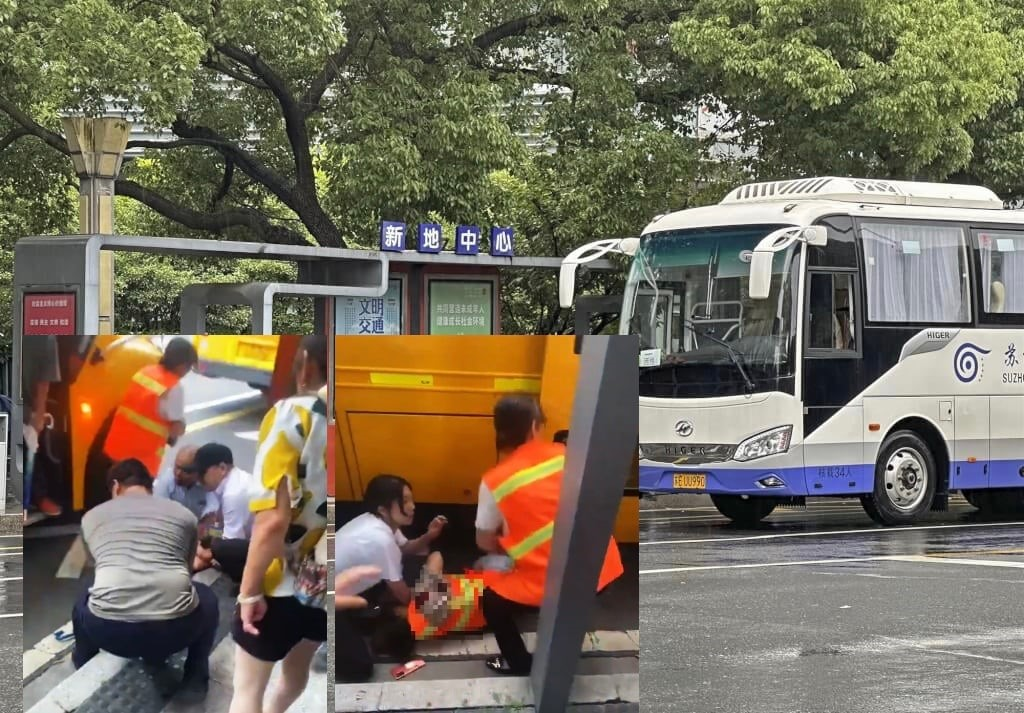Japanese living in China’s Suzhou city are more tense these days, after two recent stabbing attacks on Japanese nationals in the city that sits just west of Shanghai.
On the afternoon of June 24, while waiting for a school bus, a Japanese woman and her child were attacked by a knife-wielding Chinese man. Both victims were hospitalized with non life-threatening injuries. In a tragic turn of events, a Chinese good samaritan who tried to stop the attacker from boarding a bus was herself attacked, and ultimately died of her injuries, according to local authorities.
The next day, Suzhou police identified the assailant as Zhou, a 52-year-old unemployed man who had recently moved to Suzhou City in Jiangsu province. No motive has been reported; the investigation is ongoing.
The Japanese Consulate in Shanghai then disclosed that this wasn’t the first such incident. On April 3, a Japanese employee suffered neck injuries in a knife attack. The assailant, reportedly a Chinese national, targeted the individual on a busy street known for its Japanese restaurants, just a mere hundred meters from where the mother and child were stabbed.
Shuichi Akamatsu, the Consul General of Japan in Shanghai, met with Wu Qingwen, the Mayor of Suzhou, to demand more details about the second attack and called for increased security measures near Japanese schools.
Mayor Wu described the event as “isolated,” echoing initial investigative findings.
Yoshimasa Hayashi, Japan’s Chief Cabinet Secretary, expressed his deep regret and conveyed his wishes for a quick recovery to the victims. He directed the Japanese Consulate in Shanghai to press for preventive measures and detailed updates from local authorities.
When asked if Japanese nationals were being specifically targeted, Japanese officials stated they were unable to make an immediate assessment.
Mao Ning, a spokesperson for the Chinese Foreign Ministry, also called the incident an “isolated case,” on June 25. She said that such incidents could happen in any country and said that China is one of the safest countries in the world.
In an interview with The Epoch Times, Hayato Sato, a Japanese current affairs commentator holding a Ph.D. from the University of Tokyo, criticized the Chinese regime’s dismissive response.
“The Ministry’s lack of introspection and apparent indifference to the incident and its broader implications for Japan-China relations is troubling,” Mr. Sato said.Homare Endo, professor emeritus at the University of Tsukuba and director of the Global Research Institute on Chinese Issues, is critical of the Chinese Ministry of Foreign Affairs’ description of the recent attack as an isolated incident.
In an analysis piece published on the Global Research Institute on Chinese Issues’ official website, Ms. Endo highlighted a discrepancy between this characterization and the language used in Chinese state-run CCTV coverage, noting that the phrase was absent from news reports, which she argues signifies a clear inconsistency.
Ms. Endo further scrutinized the phrase’s omission during a spokesperson’s press conference on CCTV, reinforcing her skepticism about the Chinese foreign ministry’s narrative.
Reflecting on the broader context of Japan-China relations and societal attitudes in China toward the United States and Japan, Ms. Endo referenced a similar incident on June 11 in Jilin City, China, where four Americans were injured in a stabbing attack. She says this is indicative of a pervasive sentiment rather than isolated occurrences and cautioned Japanese residents in China to remain vigilant.
Mr. Sato also said the three attacks “cannot be considered a low-probability event.”
After the last attack, the Japanese school in Suzhou was temporarily closed, underscoring the heightened anxiety within the local Japanese community after two attacks in just two months.
CCP Propaganda’s Impact on Sino-Japanese Relations
In recent years, economic and social interactions between China and Japan have shown signs of strain despite a significant trade relationships. Japan stands as China’s second-largest trading partner with a trade volume of $307 billion in 2023, a decrease of 3.8 percent from the previous year.
While that’s a modest decrease, investment trends show a more pronounced cooling of relations. In 2022, Japan was China’s third-largest investor, but that investment plummeted by 64.1 percent to $3.8 billion in 2023.
Despite tensions, as of October 2022, there were 31,324 Japanese companies operating in China, more than in any other country.
As of October 2023, nearly 102,000 Japanese nationals were living in China, with 5,312 of them in Suzhou plus 604 Japanese companies.
Some people commented on Weibo, China’s social media platform, that they were worried if this kind of hostility continued, foreigners might leave Suzhou which would impact the local economy.
The diplomatic landscape between the two countries is heavily influenced by historical grievances as well as current political maneuvers.
Since the 1990s, under then Chinese Communist Party leader Jiang Zemin, the CCP has intensified its patriotic education, using Japan’s historical wartime actions as a focal point for criticism.
Under current Chinese leader Xi Jinping, this narrative has evolved into a robust form of national essentialism, with Japan frequently portrayed as a nemesis. Diplomatic relations between the two hit a low point in June 2023 when Chinese nationals vandalized Yasukuni Shrine, a site commemorating Japan’s fallen soldiers.
Moreover, Japan’s alignment with the United States on Taiwan and broader Asia-Pacific security issues has deepened the diplomatic standoff, highlighting the profound rifts in Sino-Japanese relations.
In light of these tensions, Kohei Morinaga, a Japanese economic analyst, told The Epoch Times, “While China and Japan are not on the brink of severing diplomatic ties, the strain between them is likely to intensify.”
“For future relations, the ideal approach is American-style diplomacy, such as imposing high tariffs on strategic materials like semiconductors, implementing export controls, and other restrictions. Japan should maintain this kind of relationship with China as well,” he added.
Ellen Wan contributed to this report.

